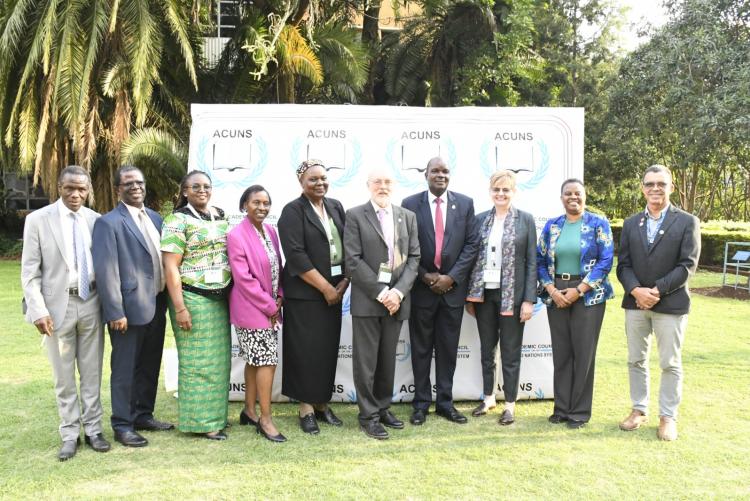The University of Nairobi (UoN) took center stage on the global academic and diplomatic calendar as it hosted the 2025 Annual Conference of the Academic Council on the United Nations System (ACUNS) from June 23rd to 25th at the historic Taifa Hall. The conference revolved around the theme, “Environmental Multilateralism and Human Development,” drawing eminent scholars, policymakers, UN representatives, civil society actors, and diplomats from around the world.
The opening ceremony, skillfully moderated by Program Co-chair Dr. Alice A. Oluoko-Odingo, set a tone of unity and urgency. She called for stronger academic engagement in global environmental discourse, stressing that sustainable development hinges on informed collaboration and institutional leadership.
ACUNS President Dr. Franz Baumann officially launched the conference with a powerful keynote that painted a stark picture of global environmental challenges. He warned of the mounting impacts of climate change—especially in the Global South—and advocated for a revitalized, inclusive multilateral system capable of addressing today’s interconnected crises. Dr. Baumann hailed Kenya and UoN for offering a vital space for dialogue and action.
On behalf of Vice-Chancellor Prof. Margaret Hutchinson, Deputy Vice-Chancellor Prof. John Mande delivered a welcome message, expressing the University's pride in hosting only the second ACUNS conference ever held on African soil. He emphasized that the theme resonated with UoN’s mission to be a transformative institution championing sustainable development and innovation.
Prof. Hutchinson later addressed the conference in a compelling keynote, “Tackling African Environmental Crises Through Research, Innovation, and Multilateralism.” She highlighted the disproportionate burden Africa bears from environmental degradation despite its minimal contribution to global emissions. Citing data from UN and UNEP reports, she called for research-led solutions and equitable international partnerships to overcome climate injustice and safeguard the continent’s future.
Kenya’s government underscored its commitment to multilateral environmental diplomacy through strong representation at the event. Ambassador Njambi Kinyungu, speaking on behalf of the Ministry of Foreign Affairs, reaffirmed Kenya’s global leadership in environmental policy. Dr. Watele, representing the Directorate for Multilateral and Bilateral Affairs, echoed the country’s support for collective environmental governance.
Across the three days, discussions ranged from biodiversity protection and waste management to climate adaptation and regional cooperation. Dr. David Obura facilitated critical conversations on ecological resilience, while African Union delegate Ms. Seraphine reinforced the AU’s support for international collaboration on sustainability.
The ACUNS 2025 Conference at UoN proved not only to be a hub for critical reflection but also a springboard for global action. As the University of Nairobi continues to invest in research, education, and international partnerships, the event underscored the institution’s growing influence in shaping a just, green, and inclusive future.

